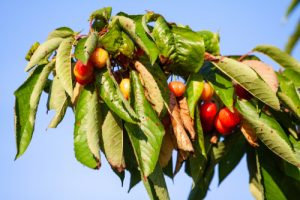
U.S. Rep. Dan Newhouse (R-WA) and U.S. House Agriculture Committee Ranking Member Glenn “GT” Thompson (R-PA) recently voiced concerns about the reemergence and spread of Little Cherry Disease (LCD), a virus that is currently impacting United States sweet cherry growers.
“As the battle against LCD continues, we respectfully request the Animal and Plant Health Inspection Service continue to work with the cherry industry and allocate additional resources to research and testing capacity to eradicate LCD,” the lawmakers wrote in an Aug. 20 letter sent to U.S. Department of Agriculture (USDA) Administrator Kevin Shea.
LCD infects cherry trees, resulting in small and bland fruit that is unmarketable, wrote Reps. Thompson and Newhouse. The virus, which first moved from Canada into Washington state and California in the 1940s and 1970s, respectively, has reemerged over the last three years and reached epidemic levels in Washington and is spreading in Oregon. Cases also have been reported in California and Utah, according to their letter.
“The only current remedy is tree removal,” the lawmakers wrote. “Replanting costs are currently estimated at $64,000 per acre, with lost revenue estimated at an additional $54,000 over the seven years it will take for the new trees to achieve full production.”
Thus far, the cherry industry has invested nearly $2 million in research on LCD, but additional resources through federal programs like the National Clean Plant Network and the Plant Pest and Disease Management and Disaster Prevention Program are needed for research and to expand testing that could reduce the potential for LCD spreading to neighboring trees and orchards, the members wrote.
Their request has garnered support from the Northwest Horticultural Council and Gilbert Orchards.
“Little Cherry Disease (LCD) is having a serious impact on the Pacific Northwest cherry industry and continues to spread at an alarming rate. We appreciate the leadership of Representative Newhouse and Ranking Member Thompson in raising the need to dedicate funds to critical research and testing needs with APHIS,” said Mark Powers, president of the Northwest Horticultural Council.



